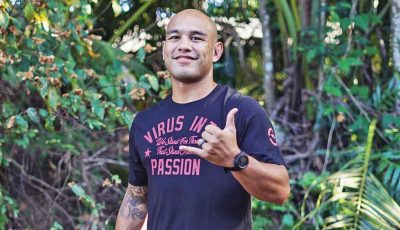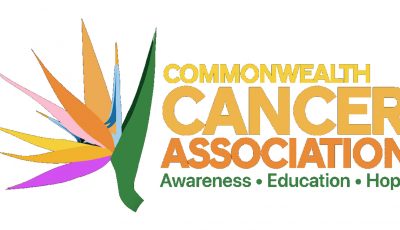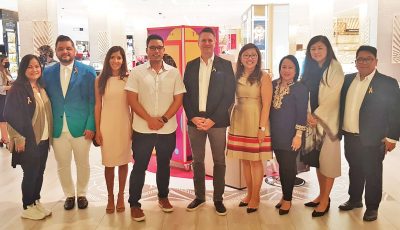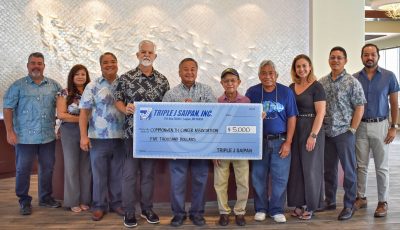Research helps in knowing more about cancer

Gov. Ralph DLG Torres, left, declares November as Lung and Pancreatic Cancer Awareness Month as Commonwealth Cancer Association executive director Juan Babauta looks on. (Jon Perez)
Alfreda Odoshi’s father could be the first case of pancreatic cancer that was diagnosed in the CNMI. Her father was diagnosed in December 2014 of the type of cancer where malignant cells are found in the pancreas, an organ that assists with digestion.
She said her father went off-island for medical referral where his attending physician found that he has pancreatic cancer. Her dad was only given six months to live and he came back to Saipan in February 2015.
“He did some chemotherapy but died shortly before six months. Our family was there to support him in whatever he needed in the final months of his life,” said Odoshi in an interview after last week’s proclamation signing by Gov. Ralph DLG Torres declaring November as Lung and Pancreatic Cancer Awareness Month.
“We were shocked when he was diagnosed with pancreatic cancer, especially when he was only given six months to be with us. We tried to make every moment that we spent with him worth it, making memories that would last,” added a teary-eyed Odoshi. “Our family rallied behind us when we lost our dad. They gave us all the love and support that we needed. We stuck together and up to now, we’re still together, giving our mom the support, and she’s been doing a great job.”
Recent statistics reveal that an estimated 48,960 Americans are going to be diagnosed with pancreatic cancer this year, making it the third cause of cancer-related deaths in the mainland, according to Hirshberg Foundation for Pancreatic Cancer Research.
Pancreatic cancer had already surpassed breast cancer and is expected to surpass colon cancer to become the No. 2 type that leads to cancer-related deaths in the U.S. by 2030.
The American Cancer Society also estimates that 53,070 Americans will be diagnosed with pancreatic cancer in 2016, with 41,780 expected to die. The survival rate of those with this type of cancer has not improved in more than 40 years.
Torres, the Commonwealth Cancer Association, and Community Guidance Center along with their private partners have been doing a lot of information and awareness campaigns.
That’s also why Odoshi and their family see to it that they participate in various programs—Marianas March Against Cancer, proclamation signing, and road side waving—and information campaigns organized by the Commonwealth Cancer Association.
“We always support whatever activities CCA have. Mostly we are focused on lung and breast cancer where other family members were also diagnosed or were already taken from us,” added Odoshi.
She said it is important for every member of the community do some research and be informed. “The community must be able to learn from it. We must be able to learn from every proclamation, take time to do some research, and learn from it.”
Support group
CCA secretary Bobbi Grizzard, who is also a cancer survivor, said doctors at the Commonwealth Health Center could check if you have symptoms. “After that, they could send you either to Guam, the Philippines or in California for second opinion to have a specialist check you up.”
She added that there’s equipment used to detect cancer cells inside one’s body. “You should go every six months or a year to have yourself checked for early detection and treatment. And you should talk to somebody if you’re diagnosed with cancer.”
“Call or visit the CCA and we’ll direct you. We have a survivors meeting every month and you don’t need to be a cancer patient or survivor to attend. You could attend to give support. There are cancer survivors who will tell you how they handled it.”
Grizzard said they also have support group for families of those who were diagnosed with cancer. “The CCA has also been one of the support group for families. Everyone is affected once you’re diagnosed with cancer.”
“There’s a feeling of fear. What’s going to happen and would this be the end? I was lucky I was diagnosed [early]. I didn’t have chemotherapy or radiation. I have to go back every six months for check up after the operation in the next three to five years.”



























